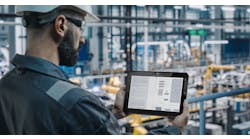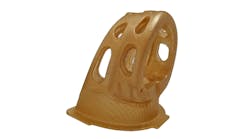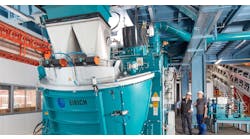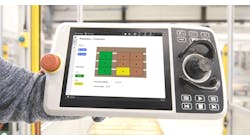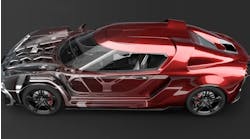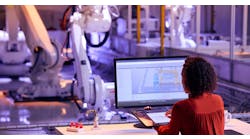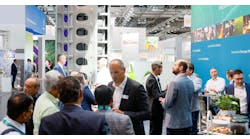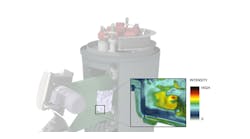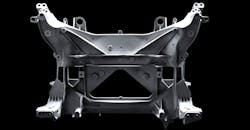Artificial Intelligence programs have been unleased on the world, leading to distraction and amusement on phones and desktops, but one foundry has found AI to be a fast track to its “organic,” optimized designs. Sarginsons Industries recently released a redesigned automotive subframe, adjusted for weight savings as recently as 2022 – and now made lighter again almost by half, from 28 kg to 15 kg, thanks to a new AI-driven software conceived to lower component mass without weakening mechanical integrity.
Sarginsons is an aluminum diecasting foundry in Coventry, England. The new subframe shows the early progress from its participation in the Performance Integrated Vehicle Optimization Technology (PIVOT) project – which is backed by two British research agencies – the Advanced Propulsion Centre and Innovate UK – and is working to develop design software capable of adapting “organic designs,” to cut vehicles’ component weight by up to 30%.
The project joins the foundry with Aston Martin and Altair, to advance vehicle manufacturing by creating lighter and more sustainable components.
PIVOT’s broad goal is to draw insights on metal solidification, digital twin simulation, and topological optimization into a single software solution. A second stage of the project will aim to improve the strength of recycled aluminum alloys, and the final stage will work to industrialize the organic designs produced by the topological optimization process.
PIVOT was initiated less than a year ago, and Sarginsons aims to cast the first parts from the designs this summer.
"With Altair's state-of-the-art technology, we are pushing the boundaries of what's possible, creating components that are not only lighter and stronger but also significantly greener,” explained Sarginsons managing director Mark Nunan.
The design Sarginsons released shows clearly where metal has been removed to reduce weight in an optimal way, illustrating how AI can simulate how and where to place material in order to achieve the mechanical strength required of the part.
“The designs don’t just look extraordinary, but by being 50 percent lighter, they are extraordinary,” according to Gavin Shipley, technical director at Sarginsons.
“We have managed to overcome the complexities of simulating the yield, tensile strength and elongation of cast components,” he continued. “We can now predict, at a point-by-point basis across the entire form of the casting, its mechanical performance. This allows for true vehicle crash performance to be simulated for the first time.
“The ability to simulate and optimize casting performance at such a granular level means we can now produce organic, highly-optimized designs that were previously beyond human imagination,” according to Shipley.
